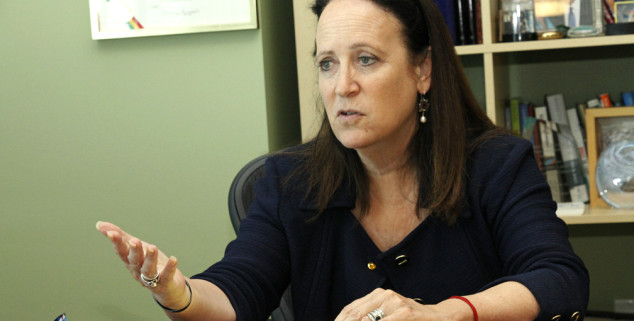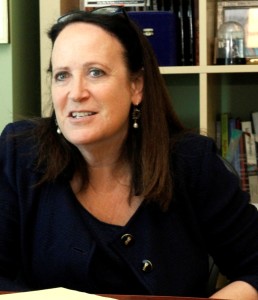News
Felicia Marcus navigates drought’s rough water
 Felicia Marcus, chair of the State Water Resources Control Board, is at the heart of California's efforts to deal with an unprecedented drought. (Photo: Phil Kampel for Capitol Weekly)
Felicia Marcus, chair of the State Water Resources Control Board, is at the heart of California's efforts to deal with an unprecedented drought. (Photo: Phil Kampel for Capitol Weekly)No matter what you might have heard, Felicia Marcus wants you to know she doesn’t hate your lawn. At least not on general principle.
“No, no, no,” Marcus, the chair of the Water Resources Control Board, says emphatically when asked about a quote in the New York Times from California Farm Bureau Federation president Paul Wenger that claimed Marcus has a personal vendetta against green lawns.
“My job isn’t to pick winners and losers, but you wouldn’t know that from the way that some people argue.”
“I don’t know why Paul would say that!” she says with an easy chuckle before offering up some clarification.
“I hate lawns that serve no purpose,” she says. “If you have a child and you want to be sure they have a soft lawn to play on, I get that. I really do. But a big green lawn that never even gets used when we’re in the middle of this kind of drought? I’m sorry, but that just makes no sense to me.”
Since being appointed in April 2013, the Los Angeles-raised and Harvard-educated Marcus has been spent a lot of time trying to make sense of a seemingly infinite number of perspectives on California’s historic drought. As the chair of the agency tasked with overseeing Gov. Jerry Brown’s calls for major statewide water use restrictions, she suffers from no lack of daily feedback, including from Brown himself. She also hears regularly from others affected by those cuts, from farmers to water agencies to perplexed homeowners, all of whom have fierce opinions about what the state should and should not be doing. It can sometimes make her feel more like a ringmaster than the person Brown calls the state’s water czar.
“I used to call myself an environmental therapist,” she says through another small laugh. “But these days I might be more of a social worker.”
“She’s clearly trying to find as much balance as possible between all of the demands on a very limited resource.”
The relentless situation also reminds her of a time 20 years ago when, admittedly under-caffeinated at an early morning presentation, she thought she heard a colleague refer to “egosystem management.” He of course had been referencing the “ecosystem,” but she never forgot the initial “aha” moment her mishearing gave her.
“These days I think it’s all about egosystem management,” she says. “In environmental public policy the biggest challenge usually isn’t technical or legal, it’s that folks aren’t listening to each other. They have a tendency not just to believe they are right, but to want to make somebody else wrong.”
“My job isn’t to pick winners and losers, but you wouldn’t know that from the way that some people argue,” she adds.
Anyone paying attention to the last 300-plus years of California water politics knows that isn’t exactly a new phenomenon. But it is one Marcus has tried valiantly to eradicate during her two years in the job. The biggest challenge, she says, is getting the stakeholders to actually talk to each other long enough to understand they can often solve each other’s problems. And while she can’t make them do anything, she can sometimes facilitate those conversations. Often it is in private but opportunities abound, including at the water board’s public meetings, which draw hordes of advocates to press their agendas. In that regard, she has made a point of running water board meetings as long as is necessary to hear everybody who wants to be heard.
While she concedes just being a good listener alone won’t make everyone happy with the board’s policies, it has at least made some of the battles less bitter.
“She is always willing to listen to people,” says John Woodling, executive director of the Regional Water Authority, which represents 25 water agencies across Sacramento, El Dorado and Placer Counties. He acknowledges his is one of the many agencies unhappy about the mandated cuts the Board has laid down, but says he greatly respects her nonetheless.

Felicia Marcus (Photo: Phil Kampel)
“It’s not an easy job. She’s clearly trying to find as much balance as possible between all of the demands on a very limited resource,” he says. “She is certainly respectful of our concerns, and she’s definitely not one to just rubber stamp whatever her staff gives her. She’s involved.”
Much has been made of the stress the job brings her on a daily basis, which is undoubtedly true. There’s not a lot of escape when you’re anointed the face of the state’s water woes. Back in her days heading the Los Angeles Department of Public Works, she would take out her frustrations at the local batting cages. These days, her precious down time is spent with her husband, playing games on her iPad or reading mysteries. Tony Hillerman is a favorite.
“I’m an extrovert and I like and respect people. But I’m also not Pollyanna about all this – this is a horrible, horrifying situation we’re in.”
But if any of this gets her down it would be hard to tell from her demeanor. Marcus is casual and friendly in a way not usually seen among high-level regulators and bureaucrats. Her office, while with the great view befitting someone in her position, is small and as cluttered as anyone else’s. Books, photos, loose files and a plethora of personal trinkets abound. One in particular she is fond of – a model garbage truck given to her during her first year as chair of the water board. Another treasured memento is a plaque given to her from one of the many Native American tribes she has worked with on water issues over the years.
She is engaging and funny, charming and relaxed. She talks with you, not at you. She sings her board’s praises, insisting someone should be doing a story on them too. She is interested in what you have to say, and her eyes light up a bit as she listens to your question. And even in the midst of the worst drought in recorded state history, she manages to keep an upbeat attitude.
“I’m an extrovert and I like and respect people. But I’m also not Pollyanna about all this – this is a horrible, horrifying situation we’re in. There’s just really no time to sit and dwell on that. We as appointed officials all have a limited time have to get things done so we just have to keep going,” she says.
Her big dream now, she says, is getting past the drought so she can work on other water issues she holds dear, perhaps none more so than ensuring all California communities have safe drinking water. Drought be damned, she calls water quality “the issue of our time.” In the meantime, she says, her task and that of her board is “to humanize the regulatory process” and create a system that moves away from punitive actions in favor of rewarding people for doing the right thing.
“The goal is solving problems,” she says. “It’s not implementing more laws or rules.”
—
Ed’s Note: Rich Ehisen, a regular contributor to Capitol Weekly, is the managing editor of the State Net Capitol Journal, where he covers public policy trends around the nation. His Twitter handle is @WordsmithRich.
Want to see more stories like this? Sign up for The Roundup, the free daily newsletter about California politics from the editors of Capitol Weekly. Stay up to date on the news you need to know.
Sign up below, then look for a confirmation email in your inbox.

[…] Felicia Marcus navigates drought's rough waters: “No matter what you might have heard, Felicia Marcus wants you to know she doesn’t hate your lawn. At least not on general principle. “No, no, no,” Marcus, the chair of the Water Resources Control Board, says emphatically when asked about a quote in the New York Times from California Farm Bureau Federation president Paul Wenger that claimed Marcus has a personal vendetta against green lawns. “I don’t know why Paul would say that!” she says with an easy chuckle before offering up some clarification. … ” Continue reading at Capitol Weekly here: Felicia Marcus navigates drought’s rough waters […]